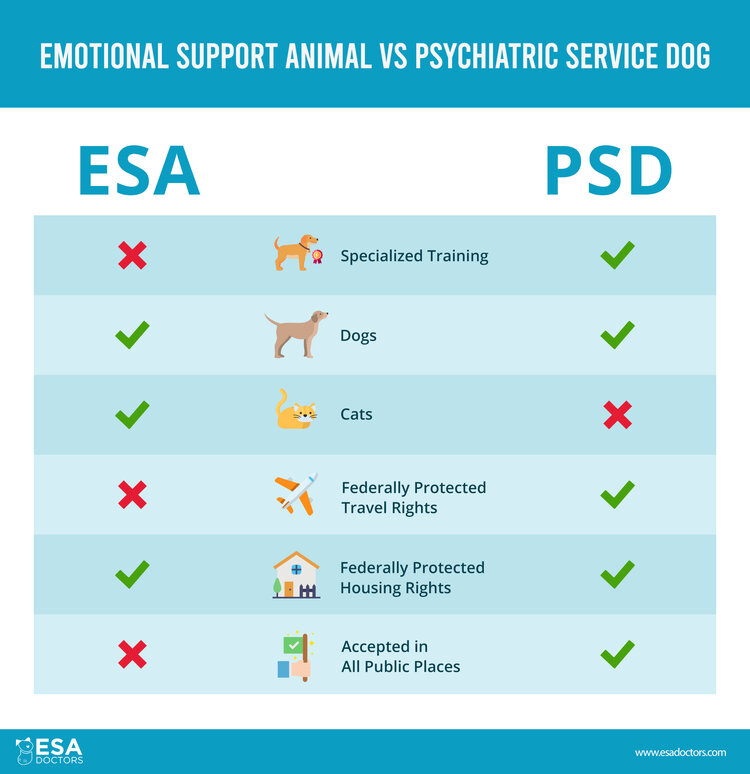With a growing number of individuals turning to emotional support animals (ESAs) for mental health, the importance of these dedicated companions has become increasingly recognized. These animals provide invaluable comfort and support, aiding individuals dealing with mental health conditions such as anxiety, depression, and PTSD. Moreover, emotional support dogs are legally entitled to specific housing accommodations. For your dog to be considered an emotional support animal, you’ll need to obtain an ESA letter. This guide outlines the process of obtaining an ESA letter for housing purposes and answers additional questions you may have.
Understanding emotional support animals and housing rights
Before we get into how to obtain an emotional support animal, it’s important to understand their purpose. An emotional support animal (ESA) provides comfort and companionship to individuals struggling with mental health challenges. Unlike psychiatric service dogs, who undergo specialized training to directly mitigate symptoms or assist with daily tasks, ESAs offer support simply through their presence. Studies indicated interactions with dogs can increase levels of serotonin and dopamine. These feel-good neurotransmitters lend themselves to improved mood and reduced stress. Unfortunately, some skeptics dismiss ESAs as a ploy to bypass housing pet fees. However, mental health professionals recognize their valuable role in alleviating symptoms and enhancing well-being.
ESAs do not have the same legal protections as service dogs under the Americans with Disabilities Act (ADA). However, they are entitled to certain accommodations under the Fair Housing Act. Landlords must provide reasonable accommodation to tenants with emotional support dogs, allowing them to keep their animals in pet-prohibited housing complexes and exempting them from breed or weight restrictions. ESA documentation ensures individuals can benefit from these housing accommodations, including exemptions from additional rent or pet cleaning deposits.

Emotional Support Animals and air travel
That said, recent amendments to the Air Carrier Access Act (ACAA) have changed the rules regarding ESAs during air travel, subjecting them to size restrictions and pet fees similar to regular pets. Despite these changes, individuals seeking canine companionship during air travel may still consider obtaining a psychiatric service dog. Unlike ESAs, service dogs remain protected by both the ACAA and the ADA.
What are the advantages of an ESA letter?
Acquiring an ESA letter is a required part of the emotional support animal recognition process. Additionally, the letter makes it possible to waive housing-related pet fees. Most importantly, it allows your emotional support dog to stay in rental properties where pets might not usually be allowed. However, it’s important to remember that while an ESA letter can provide these practical benefits, it doesn’t guarantee your ESA unrestricted access in all public places. Nonetheless, the main advantage is knowing your emotional support dog serves a purpose and can remain with you to support your mental health needs.
Who qualifies for an ESA letter?
Requirements for obtaining an ESA letter are becoming stricter due to misuse or the general belief some may feign mental health conditions to get around no-pet policies in residential buildings. If you’re wondering who currently qualifies for an ESA letter, individuals diagnosed with mental disorders whose symptoms are alleviated by the presence of an animal may be eligible. Keep in mind this must be recommended by their licensed mental health professional (LMHP).
Common mental health disorders that may qualify for an ESA letter include depression, anxiety, post-traumatic stress disorder (PTSD), obsessive-compulsive disorder (OCD), agoraphobia, bipolar disorder, grief, and other less common mental and emotional disorders. After assessment, the LMHP will determine if companionship with an emotional support animal would be beneficial. Expected benefits may include reduced stress and blood pressure, fewer panic attacks, improved daily functioning, better sleep, increased social interaction, enhanced sense of security, motivation, and overall well-being.
What does an ESA letter need to say?
As previously stated, a legitimate ESA letter is written by a practicing licensed mental health professional (LMHP). The letter should include details such as the LMHP’s license number, type, and the date of issuance. Additionally, the letter must include the date of issuance and a signature from the mental health professional who issued the letter. According to HUD, ESA letters can also be provided by nurse practitioners, as long as they possess “personal knowledge” about your mental health condition. This entails being sufficiently acquainted with your mental health to determine if you have a condition that could benefit from an emotional support animal.
Occasionally, the ESA letter may specify the chosen animal or breed, though this is not required. In any case, the letter should include your name and pertinent details deemed relevant by the LMHP. Additionally, the letter includes the recommendation for integrating an ESA into an individual’s therapy plan. This recommendation emphasizes the ESA’s role in facilitating the management of symptoms, healing, and comfort. As such, this detailed letter provides a professional perspective informing apartment complexes or landlords of the genuine purpose served by an ESA dog.
How to avoid ESA letter scams
To steer clear of ESA letter scams online, always exercise caution. Sadly, numerous dishonest businesses pose as licensed professionals while offering quick and cheap ESA letters without proper consultation. Make sure the mental health professional associated with the service is legitimately licensed. Before committing to any payment, conduct a quick Google or LinkedIn search to verify their credentials. Additionally, check if the company is accredited by the Better Business Bureau (BBB). This can help distinguish between legitimate entities and potential scams.
In order to obtain a legitimate ESA letter, an online service must connect you with mental health professionals licensed in your state. Without undergoing this evaluation, the professional cannot officially certify your need for an ESA. In most cases, it’s advisable to schedule an in-person or telehealth appointment with an LMHP to obtain your ESA letter, rather than relying on online services.
How to get a legitimate ESA letter

Step 1: Determine if you qualify
First, familiarize yourself with the criteria outlined in the Americans with Disabilities Act (ADA), which recognizes specific mental health conditions as qualifying factors for an ESA. If you believe your mental health condition qualifies, you will need to set up an appointment with a mental health professional. Thoroughly vet any websites offering assistance in obtaining an ESA letter. While some legitimate websites collaborate with mental health professionals, it’s essential to remain vigilant when sharing personal information with unfamiliar sites or organizations.
Step 2: Schedule an appointment
After thorough research, arrange a consultation with a qualified mental health professional. This may include therapists, psychologists, or psychiatrists, who will help determine your emotional support animal (ESA) needs. This appointment serves as an opportunity to understand your mental health condition and evaluate the potential benefits of having an ESA.
Step 3: Discuss ESA need
During the session, the mental health professional will assess your situation holistically — considering various factors such as your current symptoms, treatment history, and lifestyle. By speaking with a licensed professional, you can ensure you receive personalized guidance and support tailored to your specific circumstances and needs.
Step 4: Request an ESA letter
If, upon assessment, the mental health professional determines an emotional support animal (ESA) would be advantageous for improving your mental well-being, it is appropriate to request an ESA letter affirming your requirement for such support. This formal documentation serves as a crucial validation of your need for an ESA. Moreover, an ESA letter outlines the therapeutic benefits an ESA can provide to you. In your request, communicate openly with the professional. Discuss the specific ways in which an ESA could positively impact your life and contribute to your overall emotional stability. Additionally, ensure the emotional support animal letter contains comprehensive details. As a reminder, the letter should include the mental health professional’s license information, your diagnosis, and a clear statement affirming the necessity of an ESA for your well-being.
Best online ESA letter providers

There are a few online ESA letter providers that offer fast, user-friendly, and entirely legitimate services. Pettable is trustworthy and well-reviewed, and their team of licensed therapists, legal experts, and customer support representatives will work with you through each step of the process to ensure you get a valid ESA letter for housing. Pettable starts the ESA approval process by giving you a short online assessment so they can set up your consultation with a licensed mental health professional. After that, you’ll have a video consultation with a therapist who is licensed in your state. If the therapist feels your mental health would benefit from the presence of an ESA, you’ll receive your ESA letter within 24 hours of approval. CertaPet is similar to Pettable in some ways, including their three-step process to get an ESA letter, but without the money-back guarantee.
ESA Doctors is another option to consider when choosing an ESA online provider. They offer a similar telehealth service and ESA letter approval process, although there are minor drawbacks. First, click the “Get Started” button on the ESA Doctors website, which will take you to an online questionnaire. A licensed mental health professional will review your answers, after which you will submit your payment information. You will then work with a licensed therapist to get your ESA letter.
Do ESA letters expire?
The expiration of emotional support animal (ESA) letters isn’t straightforward. According to HUD guidelines and state regulations, ESA letters technically don’t have an expiration date. However, it’s advisable to keep your ESA letter current for various reasons. While your ESA letter may not have expired per se, it may not be accepted if it’s outdated. Best practice suggests your ESA letter should be no older than a year to ensure its validity. Despite the requirement for an ESA letter for housing purposes, there’s no explicit mention in the Fair Housing Act or guidance from the U.S. Department of Housing regarding the expiration of ESA letters for housing.
Cost of an ESA letter
The cost of obtaining an initial emotional support animal (ESA) letter typically varies. It generally involves a fee for a consultation with a licensed mental health professional. If you’re already seeing a mental health professional, they can offer you a letter at no additional fee to your standard visit cost. If you’re not yet under the care of an LMHP, an initial visit can range from $150 to $200, depending on the provider’s rates. In the case the LMHP accepts insurance, you may only be required to pay a simple co-pay, as with visiting other healthcare professionals. This co-pay is determined by your insurance plan.
Alternatively, you can opt for an online ESA letter service that offers telehealth consultation and an ESA letter. The reason many people choose to go through an online ESA letter company is due to their lower consultation costs. Similar to other digital health platforms, they often require lower upfront payments compared to traditional healthcare providers, making them particularly attractive for uninsured individuals. The same is true for those with healthcare policies that may not fully cover mental health services.
Beyond the ESA Letter, landlords may require additional paperwork to verify your ESA’s status. It’s important to note that the specific paperwork required may vary among landlords. Moreover, while most states do not require ESA letters to be renewed annually, landlords may request a new letter each year. Because some states mandate yearly renewals, you may be responsible for a subsequent consultation visit. You may want to spend additional time researching the laws for your state regarding ESA letters for housing.
Overcoming challenges related to having an emotional support dog
Despite growing attention to the benefits of ESAs, there can often be misunderstandings and biases. Managing public misconceptions about emotional support animals can be challenging. This is particularly true because scams illegally offer ESA eligibility and reports of the misuse of ESAs. Unfortunately, there are also reports of individuals misusing emotional support dogs. In such instances, individuals may falsely assert their ESA has legal access to public spaces to gain unauthorized entry into pet-free areas — including parks, restaurants, museums, bars, and public events. As a reminder, there are no legal protections for ESA access to public spaces. As a result of misrepresentation, it can be difficult to combat negative opinions about emotional support animals.
Navigating these difficulties requires self-advocacy, support from mental health professionals, and awareness. The most important thing to consider is the needs of those facing mental health challenges and fostering a more accepting environment for individuals who rely on the benefits of an emotional support animal.









